The Bernese Mountain dog has a certain look about them – they are strikingly beautiful and have sweet eyes.
Commonly nicknamed Berners these gorgeous dogs are quickly becoming very popular family pets.
This is a large breed with a gentle nature and is the perfect option for you if you are a first-time owner and love larger dogs.
You will find an extremely loyal friend that is great with kids and will play with them all day long.
TABLE OF CONTENTS
Bernese Mountain Dog Overview
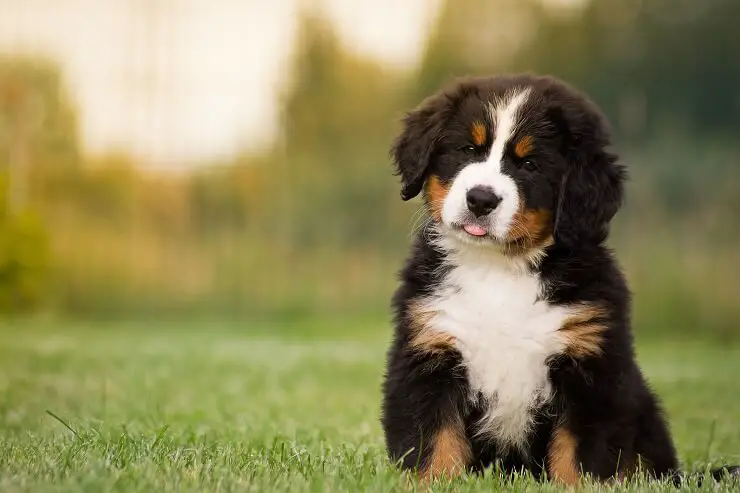
The Bernese Mountain dog was first recognized by the American Kennel Club in 1937 and is part of the Working group (they have a long and hard-working ancestry).
This dog originated in Switzerland and was used as an all-purpose farm dog. They protected the property and livestock, and were also family/companion dogs. Farmers would also use them to transport their carts of milk and cheese, gaining their local nickname Cheese Dogs.
Their ancestry can be traced even further as Berners roots go all the way back to Molosser dogs from the Roman era.
In the modern era their American history began when a Kansas farmer imported a pair in 1926 – they quickly became very popular.
They will catch your hearts with their adorable tan-marked faces and glossy coats. This striking appearance will make anyone want to be their friend.
Bernese Mountain Dog Appearance
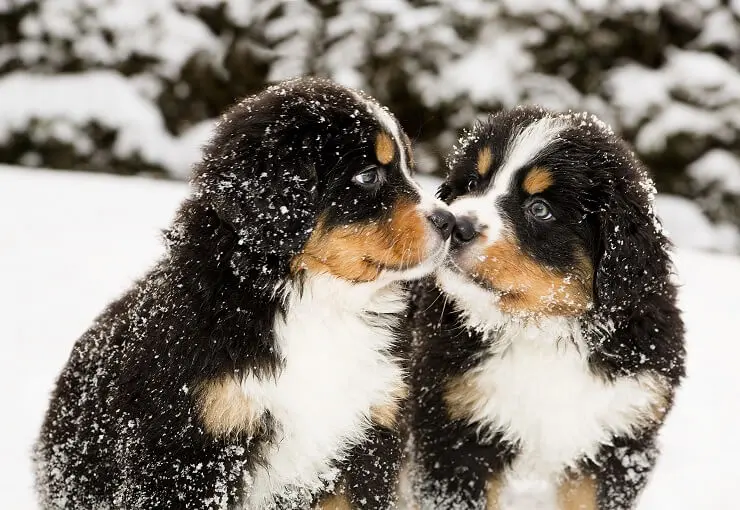
The Bernese Mountain dog has a beautiful and striking appearance.
They have oval-shaped dark brown eyes and floppy ears which gives them a gentle yet intelligent look. They have flat and broad skulls, with a slight furrow and well-defined stop. Their muzzle is strong and straight, with a black nose on the end.
Their topline is level to their withers, giving them a straight back, and it is commonly said to be longer than it is tall.
As for the tail it is bushy and carried low when relaxed.
Height and Weight
This is a large dog with males weighing 90-110lb and females weighing 70-95lb.
They can stand up to 27.5 inches as males and 26 inches as females.
Generally males will be bigger than females and they usually reach their adult size when they are around 15 months old.
Bernese Mountain Dog Colors
The Bernese has a unique and eye-catching appearance, thanks to their tri-color coat.
This tri-colored coat is made up of mostly black, with white markings around their face, chest and feet and rust colored markings above their eyes, sides of the mouth, front of their legs and a small amount on their chest.
Bernese Mountain Dog Coat
It shares similar characteristics with other Swiss mountain dogs, but the Berners are the only mountain dog with a long silky coat.
They have double coats, with a long outer coat and wooly undercoat.
You will find them with moderately long fur that can either be straight or slightly wavy. In terms of shedding, they shed a fair amount throughout the year, but mostly during shedding seasons (Spring and Fall).
To keep their natural shine and prevent matting weekly brushing is a must.
Bernese Mountain Dog Temperament
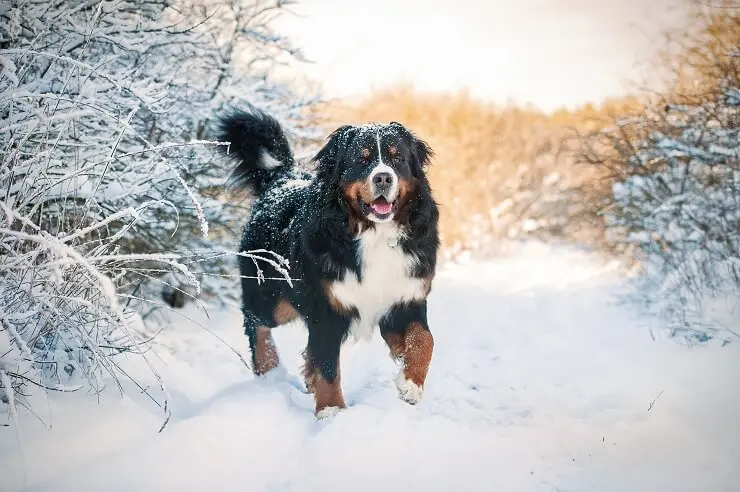
The Bernese Mountain dog is sweet and gentle natured, making them the perfect companion dog for any family.
Naturally they have a very friendly nature, meaning they will get on with anyone they meet.
Despite this, they are still fairly good watchdogs – they will definitely let you know when they don’t like something that is happening on their home turf.
They do not bark a lot, but they will be quick to let you know they are excited about something, whether that is someone coming round or they need you to do something. They won’t bark for no reason.
Due to their friendly and people-orientated natures, the Bernese Mountain dog is prone to suffering from separation anxiety, they don’t like being left alone for too long and can get lonely and frustrated.
When they feel frustrated, they will become destructive and chew anything they can get their paws on. Give them plenty of chew toys for when you leave them or take them out for a long walk before you leave them alone.
Even though they were bred as herding dogs, they don’t have a high prey drive, meaning they will not instinctively chase small animals. However, there is always a chance that the mood might take them, and they will chase the squirrel in your back yard or the neighbor’s cat!
They won’t mind other pets in their house, as long as they are introduced gradually and safely.
These playful characters will always want to be part of the fun, they will love playtime, whether that is playing fetch, chase or tug-of-war.
Can A Bernese Mountain Dog Be A Family Dog?
The Bernese Mountain dog was bred to be an all-purpose farm dog, but what makes them popular with people is their family-friendly personality.
They make a great family dog and will always get involved during playtime with the kids.
How to Train a Bernese Mountain Dog
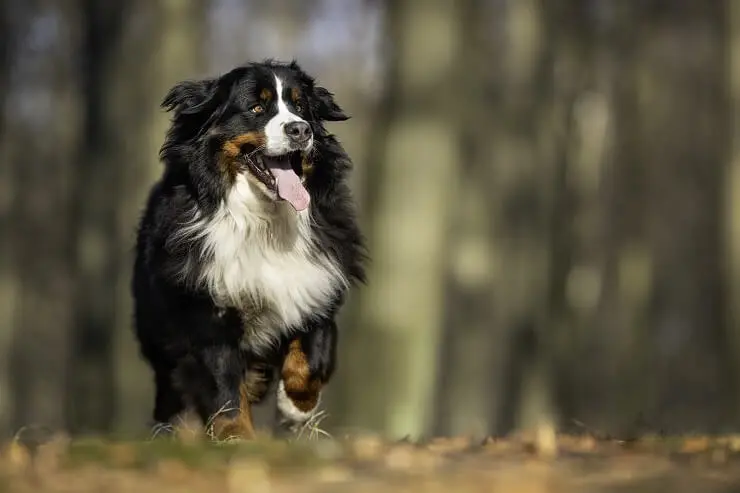
Their temperament is said to stay puppy like forever. However if they are not trained correctly, they can easily become boisterous and unruly. It’s best to make sure they don’t get too excitable, as this kind of behavior can become unmanageable when they are fully grown.
The good news is dog training should be fairly easy because they are normally eager to please and have above average intelligence.
Positive reinforcement should be used when training any dog. Be sure to give them praise and treats as a reward when they follow your command or stop an unwanted behavior.
Punishment has been shown to cause more unwanted behaviors than it stops. For example, shouting at a dog can increase their aggression.
Socialization is vital for a dog that can grow this large, as situations they are not used to can cause them to become hyperactive and unmanageable.
As a puppy you should introduce them to a wide range of people, children and dogs. You should encourage them each time by letting them know that it is a good experience – give them treats and praise.
The Bernese Mountain Dog will need mental stimulation, otherwise they will become bored and frustrated, which can lead to destructive chewing.
You can give them puzzle/interactive feeders like Kongs and play different kinds of games like hiding their favorite toy or treats.
Whatever you choose to do with your dog, will help them stay occupied and happy.
Caring for a Bernese Mountain Dog
The Bernese Mountain dog suits any kind of family, as long as you can commit your time and energy to them.
A big dog like this needs a big house – ideally one with a big fenced backyard they can run around in. Be aware that this breed might try to escape, so make sure the fence is secure.
This breed is perfect for a first time owner that is looking for a playful and loving big dog. They are not challenging to train and have a stable temperament. They do need a lot of attention when it comes to grooming and keeping them looking their best. Be advised, if you have allergies this probably is not the dog for you.
Despite their size, they don’t need as much exercise as you would think, but they still need daily activity to keep them at a healthy weight.
Exercise Requirements
The Bernese Mountain dog will need at least one hour of exercise each day to keep them healthy and enrich their daily routines.
Taking them out into the great outdoors is good mental stimulation because new smells and experiences keep Berners mentally and physically happy. If this dog is stuck inside all day, they will become bored and will start showing unwanted behaviors (destructive chewing).
However, the Bernese Mountain dog is not demanding and can be adaptable at times, meaning if you can only fit in a shorter walk every now and then, they won’t make much of a fuss.
Berners will enjoy pulling children in carts, and some even take part in carting competitions.
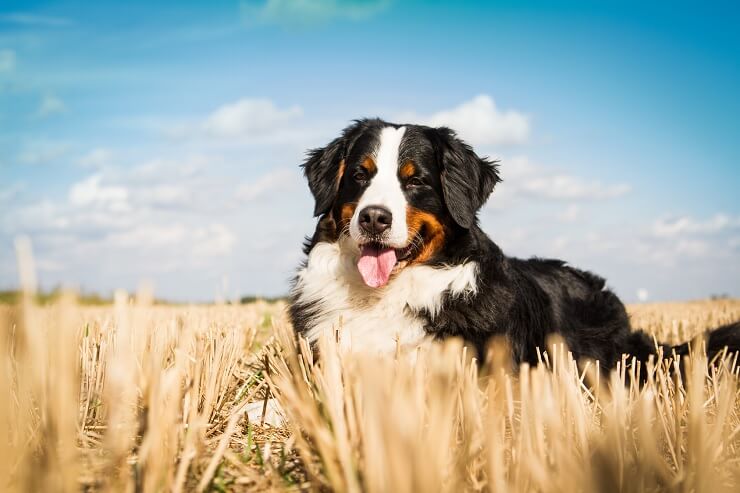
Grooming and Shedding
The Bernese Mountain dog is a long haired, double coated fluff ball. They will shed continuously throughout the year but will have a blow out twice a year.
They will shed the most in spring and fall, so be sure you start to brush them more around this time of year.
It’s best to invest in a couple of good dog brushes and a vacuum cleaner.
Brush them every day during shedding season to remove any loose chunks of fur and prevent any matts and tangles. Teach them as a pup that being brushed is a positive experience and it will make it easier for when they are fully grown.
As well as brushing their gorgeous fur, you should be clipping their nails, brushing their teeth and keeping an eye on their ears. They are prone to ear infections because air cannot circulate very well in their ears and moisture builds up, creating the perfect environment for bacteria.
Known Health Problems
Being purebred, the Bernese Mountain dog can inherit many different genetic diseases due to years of inbreeding to fit the breed standard.
Like all large dogs, they are prone to developing hip and elbow dysplasia.
They are also prone to suffering from Gastric Torsion, this is where the stomach twists and air becomes trapped (it can often be fatal). To prevent this, avoid exercising them straight after they have eaten and always give them their food bowl at ground level.
They can also suffer from different eye disorders, such as Progressive Retinal Atrophy.
However with all this said, this does not mean they are unhealthy – many Berners live a happy and healthy life.
How Long Does A Bernese Mountain Dog Live?
A healthy Bernese Mountain dog can live around 7-10 years.
Buying a Bernese Mountain Dog
If you have decided the Bernese Mountain dog is for you, the next step is to start looking to adopt or buy one.
As they are very popular in the US, some people may take advantage of this by using puppy mills to gain the most money out of them. Make sure to avoid these at all costs.
Always visit the breeder, if they don’t want you round then they are most likely untrustworthy. It’s important for you to meet mom and the litter, so you can get a feel of their temperament and how they interact with each other.
Breeders should also provide you with certificates ensuring the health of the parents and pups – they may also be registered with the American Kennel Club.
How Much Do Bernese Mountain Dogs Cost?
Bernese Mountain dogs can cost from anywhere between $800 to $2000.
Quick Breed Summary Table
| Breed Characteristics | |
| Size: | 25-27.5 inches (male) and 23-26 inches (female) |
| Weight: | 90-110lb (male) and 70-90lb (female) |
| Lifespan: | 7-10 years |
| Coat: | Long in length and double coated |
| Color: | Tri-color (black, white and rust markings) |
| Do They Shed: | Yes, with bi-annual blowouts |
| Temperament: | Sweet, friendly, docile and playful |
| Intelligence: | Above average |
| Socialization: | Good with other dogs and pets |
| Destructive Behavior: | Will chew things when stressed out |
| People Skills: | Great with people and strangers |
| Good with Children: | Brilliant with kids (very patient and tolerant) |
| Activity Levels: | Very active, they will need at least 60 minutes of exercise each day |
Summary
The Bernese Mountain dog has been used for hundreds of years as an all-purpose farm dog, but they are mostly family dogs now.
This dog will quickly become your best friend and will be loyal to you and all your family.
Their sweet natures and gentle demeanor will allow them to play with the kids until their heart’s content.
You will find they are mostly adaptable to working lifestyles, but they don’t like to be left alone for too long and need long walks every now and then.
If you don’t mind finding chunks of fur on the floor during shedding season and love a big dog, this is the breed for you.



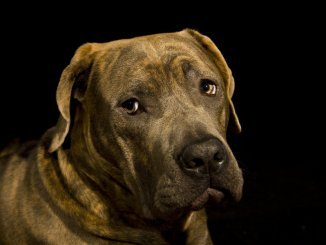

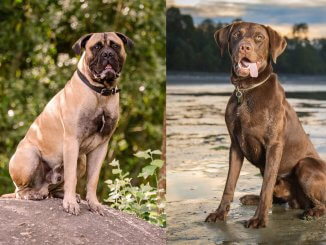
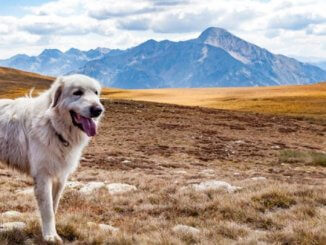


Be the first to comment